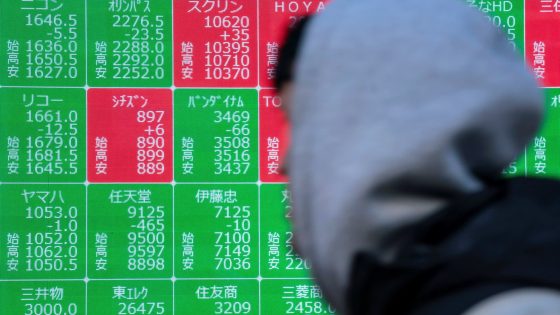Asian stock markets experienced significant declines on April 7, 2025, as the ongoing tariff war between the US and China intensified. The Hang Seng Index in Hong Kong dropped 10.7%, marking its largest intraday decline since the Global Financial Crisis of 2008.
- Asian stock markets faced significant declines.
- Hong Kong's Hang Seng Index dropped 10.7%.
- All major Asia-Pacific equity gauges fell.
- E-commerce and tech stocks suffered heavily.
- Geopolitical tensions impact market sentiment.
- Tariff threats expected to persist in 2025.
All major equity gauges in the Asia-Pacific region fell, with 11 of them reaching their lowest levels in over a year. Japan’s Nikkei 225 fell 6.2%, while South Korea’s Kospi Index and Australia’s S&P/ASX 200 also reported substantial losses.
The recent downturn in Asian stock markets is largely attributed to heightened tensions from the ongoing tariff dispute between the US and China. Analysts noted that this situation has created a wave of uncertainty that is impacting investor confidence across the region.
Key statistics from the trading session include:
- Hong Kong’s Hang Seng Index: down 10.7% to 20,404.62.
- Japan’s Nikkei 225: down 6.2%.
- South Korea’s Kospi Index: down 4.7%.
- Australia’s S&P/ASX 200: down 4%.
- Singapore’s Straits Times Index: down 8.1%.
In Hong Kong, nearly all stocks on the Hang Seng Index declined, with notable losses among major tech and e-commerce companies. Alibaba Group Holding fell 14.4% to HK$105.70, and JD.com dropped 15.6% to HK$129.50. Other companies such as Kuaishou Technology and Xiaomi also faced significant declines, reflecting the broader market sentiment.
Market analysts, including Patrick Pan and Yue Tan from Daiwa Capital Markets, expect that the “tariff threat” will continue to weigh heavily on Asia-Pacific stock markets in the coming months, potentially leading to further declines in market sentiment.
The sharp declines in Asian stock markets on April 7, 2025, underscore the significant impact of geopolitical tensions on global financial stability. With the tariff war showing no signs of resolution, investors remain cautious about future market movements.

































